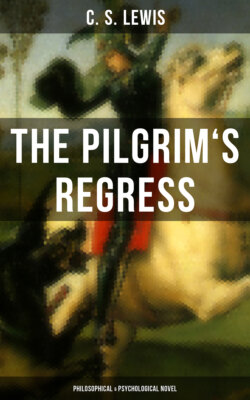Читать книгу THE PILGRIM'S REGRESS (Philosophical & Psychological Novel) - C. S. Lewis - Страница 9
На сайте Литреса книга снята с продажи.
Chapter Six
Quem Quaeritis in Sepulchro? Non est Hic
ОглавлениеTable of Contents
Sin and the Law torment him, each aggravating the other
From that day forth until he left his home John was not happy. First of all the weight of all the rules that he had broken descended upon him: for while he was going daily to the wood he had almost forgotten the Landlord, and now suddenly the whole reckoning was to pay. In the second place, his last sight of the Island was now so long ago that he had forgotten how to wish for it even, and almost how to set about looking for it. At first he feared to go back to the window in the wall, lest he should meet the brown girl: but he soon found that her family were so constantly with him that place made no difference. Wherever he sat down to rest on a walk, there sooner or later, there would be a little brown girl beside him. When he sat of an evening with his father and mother, a brown girl, visible only to him, would sidle in and sit at his feet: and sometimes his mother would fix her eyes on him and even ask him what he was staring at. But most of all they plagued him whenever he had a fit of fright about the Landlord and the black hole. It was always the same. He would wake one morning full of fear, and take down his card and read it—the front of it—and determine that today he would really begin to keep the rules. And for that day he would, but the strain was intolerable. He used to comfort himself by saying, It will get more easy as I go on. To-morrow it will be easier. But to-morrow was always harder, and on the third day it was worst of all. And on that third day when he crept away to bed, tired to death and raw in his soul, always he would be sure to find a brown girl waiting for him there: and on such a night he had no spirit to resist her blandishments.
But when he perceived that no place was more, or less, haunted than another, then he came sidling back to the window in the wall. He had little hopes of it. He visited it more as a man visits a grave. It was full winter now, and the grove was naked and dark, the trees dripped in it, and the stream—he saw now that it was little more than a gutter—was full of dead leaves and mud. The wall, too, was broken where he had jumped over it. Yet John stood there a long time, many a winter evening, looking in. And he seemed to himself to have reached the bottom of misery.
Sweet Desire returns and he resolves to make it the object of his life
One night he was trudging home from it, when he began to weep. He thought of that first day when he had heard the music and seen the Island: and the longing, not now for the Island itself, but for that moment when he had so sweetly longed for it, began to swell up in a warm wave, sweeter, sweeter, till he thought he could bear no more, and then yet sweeter again, till on the top of it, unmistakably, there came the short sound of music, as if a string had been plucked or a bell struck once. At the same moment a coach had gone past him. He turned and looked after it, in time to see a head even then being withdrawn from the window: and he thought he heard a voice say, Come. And far beyond the coach, among the hills of the western horizon, he thought that he saw a shining sea, and a faint shape of an Island, not much more than a cloud. It was nothing compared with what he had seen the first time: it was so much further away. But his mind was made up. That night he waited till his parents were asleep, and then, putting some few needments together, he stole out by the back door and set his face to the West to seek for the Island.
